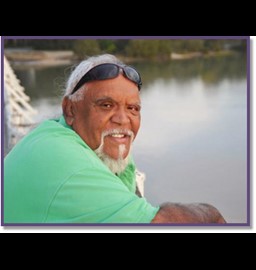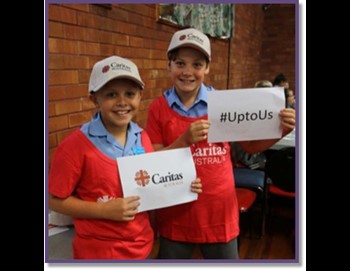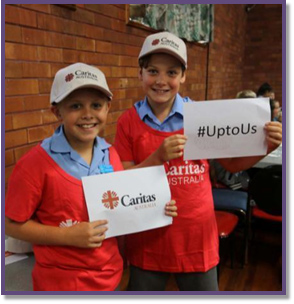 It was good to gather at the Cathedral on Tuesday for the diocesan launch of this year’s Project Compassion appeal – Love Your Neighbour. The liturgy began with the question “What does Caritas mean?” Lyrics of some of our popular songs and hymns were sung by the multicultural choir in order to assist us in deepening our understanding of the meaning of the love and compassion that comes from the word, Caritas. I hope you are able to sing to the lyrics as you read the words:
It was good to gather at the Cathedral on Tuesday for the diocesan launch of this year’s Project Compassion appeal – Love Your Neighbour. The liturgy began with the question “What does Caritas mean?” Lyrics of some of our popular songs and hymns were sung by the multicultural choir in order to assist us in deepening our understanding of the meaning of the love and compassion that comes from the word, Caritas. I hope you are able to sing to the lyrics as you read the words:
All you need is love,
all you need is love,
all you need is love, love,
love is all you need. (The Beatles)
Love, love changes everything
Hands and faces, earth and sky
Love, love changes everything
How you live and how you die (Michael Ball)
We are called to act with justice,
We are called to love tenderly,
We are called to serve one another;
To walk humbly with God! (David Haas)
Hear then what our God asks of you:
to live justly, to love tenderly,
and to walk humbly with your God. (Anne Kelly)
 This probing of the word Caritas led us to conclude that Caritas has a project named ‘compassion’. Caritas Australia is the international humanitarian aid and development agency of the Catholic Church in Australia. Through effective relationships with the Church, local partners and communities in the Middle East, Africa, Asia, Latin America, the Pacific and Australia, Caritas helps to end poverty, promote justice and uphold dignity. Their development programs, advocacy and education initiatives promote the dignity of every person, regardless of the religious, political or cultural beliefs.
This probing of the word Caritas led us to conclude that Caritas has a project named ‘compassion’. Caritas Australia is the international humanitarian aid and development agency of the Catholic Church in Australia. Through effective relationships with the Church, local partners and communities in the Middle East, Africa, Asia, Latin America, the Pacific and Australia, Caritas helps to end poverty, promote justice and uphold dignity. Their development programs, advocacy and education initiatives promote the dignity of every person, regardless of the religious, political or cultural beliefs.
On Friday night, about 50 people attended the Caritas dinner where Richard Campbell, one of the First Australian People, spoke of his experiences of being taken away from his family along with his brother and three sisters. He and his brother were placed in Kinchela Boys Home (KBH) at Kempsey, a place in which they were treated harshly and were taught to be brutal to each other, as well as having their culture and language denied. Upon leaving this ‘home’, he spent many years masking his broken life with alcohol and drugs, but with the help of his sister Louise, life began to change as he sought purpose and solace in his artwork, which can be found around our diocese, in other dioceses and around the globe. His is a story of disadvantage, healing, hope and family. Richard is a very gentle soul who is able to share his story with purpose and without malice.
 Caritas is supporting the Kinchela Boys Home project in which they hope to convert the old ‘Home’ into a place of healing and hope. The KBH Aboriginal Corporation (KBHAC) was established by KBH survivors to reunite with one another and begin healing. KBHAC’s Unlocking the Past to Free the Future Program works to restore the social and emotional wellbeing of the survivors and their families. The former KBH boys have realised that their shared suffering has created a brotherhood. They support each other by sharing their stories, and coming to a common understanding of how their experiences have impacted on themselves and their descendants.
Caritas is supporting the Kinchela Boys Home project in which they hope to convert the old ‘Home’ into a place of healing and hope. The KBH Aboriginal Corporation (KBHAC) was established by KBH survivors to reunite with one another and begin healing. KBHAC’s Unlocking the Past to Free the Future Program works to restore the social and emotional wellbeing of the survivors and their families. The former KBH boys have realised that their shared suffering has created a brotherhood. They support each other by sharing their stories, and coming to a common understanding of how their experiences have impacted on themselves and their descendants.
Through KBHAC, the men are also opening the door to the wider Australian community, inviting everyone to journey together as neighbours in the healing process. Caritas Australia supports KBHAC and is proud to walk alongside, in partnership, on the journey to wellbeing.
You can connect to Uncle Richard’s story in Week 3 of the Project Compassion campaign. It this is not being shown in your parish, I invite you to go to the Caritas website once a week and listen to the six weekly stories of some of the projects which are supported by Caritas through Project Compassion. You will hear stories from the Philippines, Vietnam, Timor Leste and Fiji.
At the end of the launch of Project Compassion, Bishop Bill commissioned those present with the following words:
The Lord’s Prayer reminds us that relationship is the heart of our faith.
This year I am doing more than handing out Project Compassion Boxes. This year I am commissioning you to take up Caritas’ Compassion Project with the love and compassion we saw in the Good Samaritan.
 Whatever community you belong to – a school, a parish, a religious community, the St Vincent de Paul Society … – this Lent I commission you to:
Whatever community you belong to – a school, a parish, a religious community, the St Vincent de Paul Society … – this Lent I commission you to:
Contemplate: Pay attention to your relationship with God: spend more time with God, experiencing the love God has for you and the world.
Pray: Take to heart your responsibility as a baptised person to pray for others.
Listen to and sit with the stories Project Compassion offers each week of Lent. What is God asking of us through these stories?
Meet your neighbours: Are there people from the Philippines, Timor-Leste, Vietnam, and Fiji in your neighbourhood? Are there Aboriginal people? Gather with them. Listen to their stories. How could you be better neighbours to each other in 2017?
Be generous: Give as much as you can to the poor via the Project Compassion boxes we will give you. The stories help you know what a difference that money makes to our neighbours.
And fast: fast from the things in your life that aren’t neighbourly; that block relationships and the human flourishing of those around you.
Be creative about how you engage with Project Compassion in 2017 so your community is known for the way you love your neighbour.
Then, as a sign of our acceptance of this mission to fully participate in Caritas’ Compassion Project in 2017, each parish and its schools along with other Catholic groups within the diocese were called and presented with the Commission and a Project Compassion Box.
Our readings for the First Sunday in Lent challenge us to discern between what is truly good and what is apparently good. Evil does tend to disguise itself and we must pray for the gift of discernment in our daily decisions. I quote Fr Andrew Doohan who wrote in the St Benedict’s Parish bulletin on the weekend:
Lent is not about me and my practices of prayer, fasting and almsgiving for their own sake. Lent is about the practices only in so far as they help me refocus my attention on the great feast of Christian faith, and prepare for that celebration renewed and refreshed. If they aren’t Easter-oriented, these penitential practices are, for all intents and purposes, pointless.
So at the very beginning of our Lenten journey, let’s make sure that we are journeying for the right reason: with our eyes fixed firmly on God and what we are to celebrate on Easter Sunday.

May you receive and give compassion during this season of Lent.

